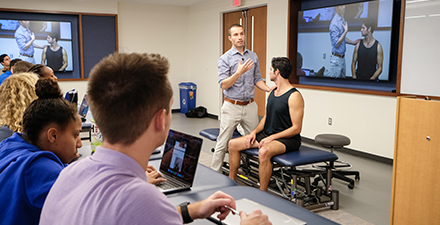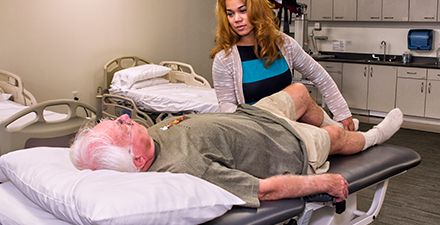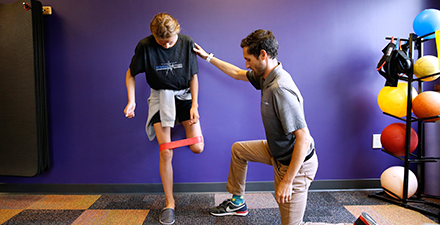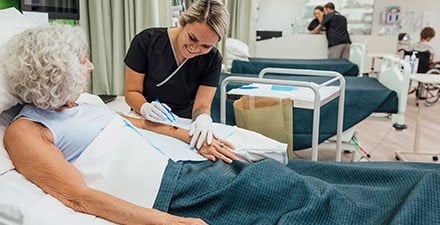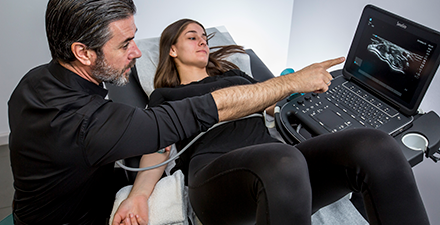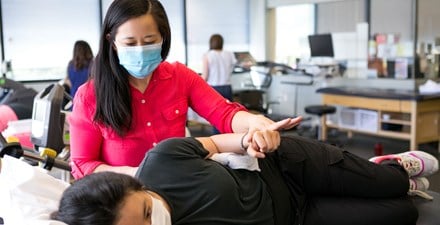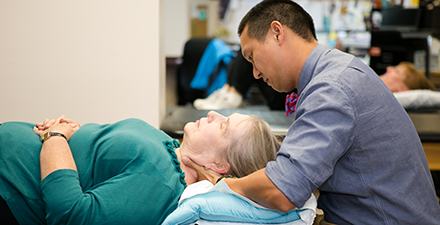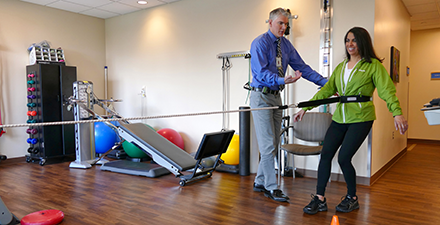By using this site, you are consenting to our use of cookies. To find out more visit our privacy policy.
Residency Practice Areas
ABPTRFE currently accredits physical therapist residency programs in Acute Care, Cardiovascular & Pulmonary, Clinical Electrophysiology, Faculty, Geriatrics, Neurology, Oncology, Orthopaedics, Pediatrics, Sports, Women's Health, and Wound Management.
Fellowship Practice Areas
ABPTRFE currently accredits physical therapist fellowship programs in Critical Care, Hand Therapy, Higher Education Leadership, Neonatology, Neurologic Movement Disorders, Orthopaedic Manual Physical Therapy, Performing Arts, Spine, Sports Division 1, and Upper Extremity Athlete.
Establishing A New Practice Area
ABPTRFE has outlined procedures to establish a new area of physical therapist residency or fellowship practice.
Accreditation Timeline and Overview
ABPTRFE meets three times annually to make initial accreditation decisions in January, May, and September based on the initial accreditation tracks (e.g., Track One, Track Two, Track Three), as outlined within the ABPTRFE Processes and Procedures.
Developing programs are encouraged to begin by reviewing ABPTRFE's Initial Accreditation Timelines and consult with ABPTRFE staff for planning purposes.
Interested programs should begin preparing for the application process by reviewing the Self-Evaluation Report and Exhibits a minimum of nine to 12 months prior to submitting the Application for Candidacy.
- May 2023 Editorial Changes to Quality Standards
- Quality Standards 2023 Clinical
- Quality Standards 2023 Non-Clinical
- ABPTRFE Processes and Procedures
- Accreditation Fees
ABPTRFE Places a Stay on Standards 3.1 and 3.6 in the 2023 Quality Standards for Clinical and Non-Clinical Physical Therapist Residency and Fellowship Programs
The American Board of Physical Therapy Residency and Fellowship Education has voted to place a stay on Standards 3.1 and 3.6 in the 2023 Quality Standards for Clinical and Non-Clinical Physical Therapist Residency and Fellowship Programs effective immediately. Programs preparing self-evaluation reports, candidacy applications, or other accreditation-related submissions should not provide a response to the diversity, equity, and inclusion elements within these standards, as this information will not be considered in an accreditation review or decision.
This decision reflects recent federal and state developments relating to accreditation requirements that include elements relating to diversity, equity, and inclusion in education programs. ABPTRFE stands behind the lawfulness and appropriateness of its accreditation standards. However, ABPTRFE also recognizes that recently enacted and pending legislation in several states and federal guidance to accreditors and institutions of higher education may affect the ability of accredited programs to fully meet the expectations of Standards 3.1 and 3.6. In alignment with its mission to assure quality while respecting the different legal contexts in which accredited programs operate, ABPTRFE took this action to:
- Eliminate any real or perceived conflict between the requirements of these standards and evolving law; and
- Ensure a consistent and equitable set of accreditation expectations for all residency and fellowship education programs, regardless of their geographic or legislative environment.
The board will engage in the standards review process to evaluate the future status of these standards in accordance with ABPTRFE’s Processes and Procedures (Policy 15.0). This review process is also a recognized best-practice standard of specialized and professional accreditors, as outlined by the U.S. Department of Education and Council for Higher Education Accreditation. This review will be guided by ABPTRFE’s commitment to public protection, educational quality, and compliance with applicable law.
ABPTRFE remains committed to supporting high-quality physical therapy education while navigating a dynamic legal and policy landscape. For additional information or questions, please contact Kendra Harrington, Director, Residency and Fellowship Education and Accreditation at kendraharrington@apta.org.
Clinical Program Self-Evaluation Report
Non-Clinical Program Self-Evaluation Report
- Exhibit 2: Mission and Goals Chart
- Exhibit 3: Assessment Table
- Exhibit 8: Non-Clinical Program Faculty Qualifications Chart
- Exhibit 9: Clinical Program Faculty Qualifications Chart
- Program Financial Fact Sheet 2026
- ABPTRFE Mentoring Observation Evaluation
- Annual Continuous Improvement Report
- Substantive Changes
- Non-Substantive Changes
- Site Visit Guidelines
- Residency/Fellowship Education HUB
- Courses
- Tutorials
- Recorded Webinars
- ABPTRFE In-Person Accreditation Workshop
- Join ABPTRFE on Monday, March 9, for this hands-on, interactive ABPTRFE Accreditation Workshop designed for residency and fellowship program administrators, directors, coordinators, and faculty. Building on the online Candidacy and Accreditation Workshops, this in-person session offers practical application and guided work time to draft or refine key sections of your program’s Self-Evaluation Report and exhibits. Participants will benefit from small-group discussions and individualized guidance from ABPTRFE Commissioners and staff, gaining valuable insights and strategies to strengthen their programs and navigate the accreditation process with confidence. Learn more and register now.
- ABPTRFE 2026 Webinar Series
Join ABPTRFE for the following webinars scheduled in 2026. Recordings will be available on the ABPTRFE website after each session.
-
April 16, 7-8 p.m. ET
Mentoring vs. Clinical Instruction: New Resources, Distinctions, and Site Visit Takeaways for Success
ABPTRFE is hosting a webinar on mentoring in physical therapist residency and fellowship education, highlighting how it differs from clinical instruction in professional degree programs. The session will showcase updated APTA tools and resources and conclude with a Q&A.
Please register in advance. After registering, you will receive a confirmation email with details on how to join.
Email questions to ABPTRFE in advance of the webinar.
-
Aug. 13, 1-2 p.m. ET
Stronger Together: ABPTRFE & CAPTE Integrated Commission Town Hall
ABPTRFE is hosting a unique opportunity to hear directly from leaders of both accreditation commissions. This interactive session will provide updates on merger efforts, highlight key initiatives, and offer a forum to ask questions and share insights. Don’t miss this chance to engage with the commissions shaping the future of physical therapist education.
Please register in advance. After registering, you will receive a confirmation email with details on how to join.
Email questions to ABPTRFE in advance of the webinar.
-
Nov. 5, 7-8 p.m. ET
What Tools and Resources Exist for You: Navigating the ABPTRFE Website
Discover how to make the most of the ABPTRFE website in this webinar. This session will guide you through key resources, tools, and features available to support residency and fellowship programs. Learn tips to efficiently access and utilize the information you need and get your questions answered in the live Q&A.
Please register in advance. After registering, you will receive a confirmation email with details on how to join.
Email questions to ABPTRFE in advance of the webinar.
-
- Reference Documents
Descriptions of Residency Practice
DRPs are used by programs to reduced unwarranted curriculum variability; provide residents minimum consistency in learning experiences for that area of practice; and streamline the accreditation process for reporting.
Descriptions of Fellowship Practice
DFPs are used to reduce unwarranted curriculum variability; provide fellows-in-training minimum consistency in learning experiences for that area of practice; and streamline the accreditation process for reporting


